- Home
- Dana Cameron
The Curious Case of Miss Amelia Vernet Page 2
The Curious Case of Miss Amelia Vernet Read online
Page 2
“Beggin’ your pardon, Mr. ’olmes, sir, but before you go any furver, we’d like a word.” Hal and Jack stood straight as they could, their caps in their hands. Hal was polite enough to my Cousin, I noticed.
“Yes?”
“We . . . ahem . . .” Jack started. “We . . . we want to hire you, like.”
“You do, do you?” Sherlock rose from his chair, and indicated two seats opposite him. I could hear amusement in his voice. “Very well, gentlemen, if you’d take a seat, I’d be happy to hear your case.”
“We can pay,” Jack blurted. “We ain’t asking no—ahem . . . favors, on account of you knowing us.”
“We can, Mr. Holmes.” Hal stuck out his hand. “If you need more . . . we . . . we’ll get more. Somehow. Don’t you worry.”
Sherlock made a show of picking up each coin—three pennies, a dirty shilling, and a shiny new shilling—as if counting them, but it was really to show me.
“They’re real enough,” Hal said a trifle hotly. “Sir,” he added.
“Indeed they are, but you’ve given me too much. I am already investigating a case I believe to be connected with this.” He picked out the three pennies, leaving the two shillings behind. I had no doubt it was a great deal to the two boys, but any of the Irregulars would have sacked Rome to help Billy, and Sherlock’s refusing any payment would have been an insult to their pride.
“Thank you, gentlemen. Now, pray, sit and tell me your problem.”
“It’s about Billy, sir,” Jack said. “Billy Wiggins.”
“As you’ve said. Please start from the beginning.”
“Not much to tell, Mr. ’olmes, sir,” Jack started. “We come back to our squat, Billy, Tommy, and me, and was set upon. Three big blokes, faces covered. They wanted Billy, that’s sure. When they went after him, we fought back.”
“Fought back hard,” Hal said. “A proper barney.”
“I went down,” Jack continued. “and hit me ’ead. Don’t know how long I was out.”
“That’s when I found them,” Hal said. “I came in later, found Jack just coming ’round, Tommy out cold, and Wiggins gone. Blood all over. We got Tommy here, fast as we could, sir. Din’t know what else to do, Mr. Holmes, sir.”
Sherlock insisted they describe the scene over and over, until he was certain he knew all they knew. By the time they were done, I also knew the location and position of Tommy’s prone body, where they’d walked, the number of men who’d barged in, and how they were dressed.
“We’ll go now,” Sherlock said. “I’ll see the place myself. Two minutes, gentlemen.”
He went by me, and I followed into his room as he dressed to go out. “You heard all?”
“Yes. Let me come with you!”
As soon as the words were out of my mouth, I regretted them.
“Impossible. The lads would never understand, and I don’t have time to make them. Prepare for action here, and consider the boys’ story while I’m away, a mental exercise. Do you understand me?”
“I do, sir—only . . . who do you think beat Tommy? And why—” My interest in Tommy should not be so obvious, so I went on. “Where do you think Wiggins is? What if—”
I saw Cousin Sherlock’s brow furrow and knew I’d been too hasty, too eager in my curiosity. “Amelia, so many questions, and the wrong ones. Why don’t you attend to your dollhouse?”
“But Sherlock, I’m far too old—!”
“Amelia.”
I was so angry, I very nearly told him to play with his own dollhouse, but when he took that tone, there was no more debating the matter. My shoulders slumped; I wanted to help—I didn’t want to be stuck away in my room. “What will I need?”
“Mrs. Hudson will see you right.” He relented as he pulled on his coat and gave me the barest hint of a smile, which almost made me press my protests. A slight narrowing of his eyes convinced me to save his goodwill against another time. “I’ll be back shortly.”
“Yes, Cousin.”
I hurried to the kitchen and Mrs. Hudson’s office. On my way in, I peeped in at the boys: Hal glared at me again. Jack never noticed me; he was patting Tommy’s hand nervously.
Mrs. Hudson was just outside her office, discussing fine metalworking with the locksmith. Their discussion concluded, she gave him some money in exchange for a small package.
Lock picks, I wondered? No, it was too large a package for that.
Giving instructions to the housekeeper, Mrs. Hudson invited me into her office, shut the door, and from a locked cupboard, handed me a small basket.
“Amelia, dear, I thought you’d be wanting these,” she said.
“Was that the Sight, Cousin Martha?” I preferred to call my Family by their true names when I could do so privately. As an orphan, I clung to my more distant relations, and they to me.
And being that we were all Fangborn and given special powers to protect Ordinary mankind from evil, our Family was all the more important to us. If you could heal wounds or detect truth or suggest a new truth, like Cousin Sherlock, who was a vampire, or if you could change into a wolf’s shape and track down evildoers, like me, you would understand. But if you had no such knowledge of our lofty goals, you might be terrified. So we kept to ourselves and fought evil secretly.
The current craze for thrilling and fantastic literature amused me. What have we to do with walking corpses who can only be held in their grave by stakes driven through their hearts? We Fangborn are never wrong in detecting evil—in a thousand cases, I am not aware that I have ever used my powers on the wrong side. We cannot leave a case, once we undertake it, but are like racing engines connected to a powerful machinery for good.
“Och, nae, not the Sight. It’s knowing you, and knowing Sherlock Holmes’s habits.” Martha laughed as she arranged a few small articles of clothing carefully over the top of the basket; it now looked as though I had a small pile of plain mending to do. “Not such a grand leap of guessery and deduction or what you will call it. There’s a bookmark to the page, my dear, and do be careful with the blood. It stains.”
I nodded, took the basket, and hastened to her office door. “Slowly, Amelia. Practice stealth, indoors!”
I would practice speed and stealth, I decided stubbornly, as I shut the door behind me. For if Cousin Martha couldn’t hear me, she couldn’t rebuke me for running in the house. I did reasonably well, for I startled the maid-of-all-work on the stairs.
“Oh, miss!”
“I’m sorry, Emily.”
“You ought to walk like a young lady,” she reproved. “What with you coming out in two years.”
Technically, I was older than she, but looked about sixteen. Those of us born to the Fang tend to mature more slowly, as if to make up for our great longevity, but I had “debuted” in my own society and was completing my training outside the safety of the Fangborn’s secret academies, among the Ordinary population.
“Running about, and you seeing that awful sight in the hallway?” She sighed. “But Mr. Holmes will have his urchins upstairs and down, like a plague. Do you want me to bring you some warm milk?”
She had an air of disgust and concern, as if the mere presence of poor boys was a cause for distress.
“No, thank you, Emily.”
“Then let me be about my work, so I can go to bed. And no more running, if you please, miss!”
Acting like a girl growing to a lady was my disguise. “I can walk very nicely, when I please.” And I stuck my nose high in the air, made my back ramrod straight, and took the most mincing of steps up the stairs.
Emily couldn’t help giggling. “It’s no way for a young lady to behave, Miss Amelia.”
Her laughter told me my imitation of an immature Ordinary girl had succeeded. “I am doing my best, I assure you.”
I liked Emily, I thought as I climbed to my room, but there was no use cultivating a true friendship with her. She’d never allow it, her own sense of propriety regarding th
e classes far exceeded my own.
I shut the door behind me and set the basket down.
Moving to the part of the room most distant from the rest of the house, I burst into tears, so quietly, it was barely detectable even to me.
Tommy and I were terribly in love.
It had started off innocently enough. I saw him outside the Old Adelphi where he was reading the bill. I hadn’t known Tommy could read, but managed to hide my surprise and greeted him. He spoke nervously to me at first, knowing who I was, then warmed as we chatted about theater.
He’d been living with his grandfather, who’d recently died. Rather than live with distant relations in Penzance, he’d run off to London.
The distant relations must have been unspeakable if these unkind streets proved more attractive.
Over the months our friendship had developed. He had been educated at home, for a while, and we shared many interests.
And he, too, was a kind of protégé of Sherlock Holmes, though he had no idea how extensively my training mirrored his own.
This was one of the reasons I was so in favor of Introducing ourselves to the Ordinary world. I envisioned a utopia, where humans were safe from evil, carefully guarded, and familiar with us. I believed that in doing so, there was a good chance that together with Ordinary humans, we Fangborn could remove the threat of war, forever. This was particularly important, as Cousin Mycroft had foretold conflict on an unheard-of scale within the coming century.
There would be no more lies. To anyone. No need to hide, no need to deceive those closest to us.
The thought of Tommy unconscious, injured, and me unable to do anything—I did not often regret my birth to the wolfish side of the Family, but I could not heal him as Sherlock, a vampire, could.
But there. Tommy was safe now, in the capable hands of Doctor Watson and Cousin Sherlock. If I was to keep our mutual friend Billy safe, I would have to apply myself as strictly as my Cousin to the case.
The notion that I might be able to save Billy with some observation of my own and make myself admirable in Tommy’s eyes was perhaps unworthy, and I set it aside.
I pulled out the volume of housekeeping records from the basket. A little embroidered tag marked the page near the end of the small book, only a few blank pages left. The heading read “William Wiggins, Harold Schulz, John Cooper, and Thomas Turner,” and on the page was a plan of the room where the lads had been living recently.
Mrs. Martha Hudson, née de Walden, kept plans of the many properties she owned; this was the fiftieth volume so far. In addition to the houses on Baker Street and her other properties, she kept and maintained a number of bolt-holes across London for use by Sherlock, me, or any member of our Family. Tracking and fighting evil sometimes required a safe place to recover, to change one’s appearance, or simply to disappear.
The ink was still dark and fresh on this page. The four friends didn’t have a fixed abode. This room, a sort of temporary camp in an empty house, was a luxury for them.
With many of the plans, there were fine sheets of tracing paper, showing the observations we’d made and recorded in the course of our investigations. Accordingly, I traced the room’s dimensions on another piece of paper, then pulled the dollhouse furniture from the basket. Studying the page, I arranged the furniture as the lads had described. I took one small male doll, wonderfully articulated, and put it on the floor to show where Tommy had been found, according to Hal and Jack. I also took a tiny eyedropper, uncorked a small brown bottle, and again, carefully consulting the drawing, added small amounts to a fine brush, and delicately re-created the bloodstains. I conjured my memory of the boys’ descriptions: there had been no unusual odors, no disturbances noticed by the neighbors, nothing awry but two boys beaten and one kidnapped.
Most of the blood must be Tommy’s, I decided, because he lay there the longest and had the worst wounds of the boys. I hated the idea but put my affection for him out of my mind, the better to help him now. The roster of unhappy outcomes was already far too extensive.
An hour later, Sherlock returned. He’d learned nothing to add to what Jack and Hal had told us. “But neither one of them is telling the entire truth. I could not question them more deeply, as several other of the Irregulars appeared.”
“I suppose it would not be unusual for those who live such lives to have secrets,” I mused, thinking that Hal had kept my—or rather, Tommy’s—secret.
“Perhaps not, but I will have to speak with one under vampiric compulsion. Oddly, I believe I have another part of the puzzle, but as yet, no notion as to how they fit. You heard me mention to Doctor Watson that someone nearly knocked me over earlier?”
I indicated my assent.
“Although I admit that I observed less than I would have liked, I immediately identified the coat and hat. They were from the bolt-hole near the museum, in Russell Square. There is only one other living human being who knows about it, too, and he had the strictest orders to use it only at the utmost necessity. That was young Wiggins. It was . . . a kind of test, for him. You know to what I refer?”
I did. Cousin Sherlock was testing, very carefully, a plan by which we might Introduce ourselves to Ordinary mankind. It was only because he was so well respected among our Family that he was given license to explore whether he could take young people—those denizens of the street with no kin but skilled in discreet movement, theft, and survival—and trust them with our secrets. He must have been very sure of Wiggins, because our refuges are terribly important. Sherlock’s notion was that, with certain unusually clever humans, those willing to think beyond the confines of society and who were academically or physically talented, we might form a kind of extraordinary league, Fangborn and Ordinary together. They would be the thin end of the wedge in our quest to Introduce ourselves to Ordinary humans. To my Cousin, it was another experiment, but of sociology or anthropology, rather than chemistry.
“Did you truly not recognize the person who bumped into you?” I asked hesitantly. “I notice you do not use ‘gentleman’ or ‘lady.’ ”
“Only the stolen clothes.”
I brought up the question I feared. “But nothing else?”
“Nothing else. It is fatigue, as I told Watson.”
This was bad. Vampires are prone to exhaustion if they do not rest and get enough sun, which acts as a kind of fuel for them. So although it was possible that Cousin Sherlock was weak from exertion and too many nighttime investigations, it was unlikely that it would reduce his famous mental acuity so profoundly.
I nodded, making a note to ask Cousin Martha if he was eating properly. “And we must assume that the bolt-hole is found? Has Wiggins betrayed us, his abduction a ruse?”
“Wiggins is sea-green incorruptible,” Sherlock said with some asperity. “I believe much worse than that, Amelia. Wiggins has been taken prisoner because of us. Me, specifically.”
“What!”
“I believe Wiggins has been followed because of his connection to me. When he escaped his captors at the squat—or perhaps they let him escape—he sought refuge at the bolt-hole, as I instructed him. He was followed and the bolt-hole revealed, along with more of my operation.” Cousin Sherlock's face was hard and his mien grim. “I only hope for the kidnapper’s sake that Wiggins lives still.”
“What now?” If Sherlock was being followed, targeted, it was possible the entire Family was in danger, and therefore countless Ordinary lives at stake.
“We have an appointment, me in particular, you in the shadows. Later this evening. The disguised person, in addition to his clothing, left me an even more obvious message, shoved into my pocket.” Here Cousin Sherlock looked abashed. “I was so deep in thought that I never noticed the note being placed there. An unforgivable offense on my part.”
I could only stare. There was something desperately wrong, and I could no longer politely avoid it. “Cousin! It must be . . . did you detect the presence of black hellebore or any of the
other things that may kill or weaken us?”
“I did not, and as you yourself know”—he nodded toward his bubbling experiment on the table—“I have conducted a comprehensive study of them and their effect on us.”
“On you, you mean,” I said, glancing at the battered syringe case on the mantel. “Perhaps you’ve reached the limit of what you can safely tolerate?”
“I think I know myself well enough, Amelia Vernet.” To prove it, he bared his wrist and summoned his other self. His face shifted to a serpentine aspect, his fine brow and high cheekbones now showing pale-greenish scales, his hawk-like nose diminishing to a broad bump, his teeth extending to fangs. He bit into his own wrist, tasting the blood.
“I detect nothing that I know harms us,” he said, Turning back. He proffered his wrist.
I sniffed delicately. I am no vampire, but a wolf-woman, and know the scent of blood in many forms. I delicately lapped at the blood and frowned. My Cousin was correct, in that I could not detect any familiar toxins. However, Sherlock’s blood was not the same as it usually was.
The difference might have been created by one of the many tests he made upon himself. My Cousin is Sherlock Holmes; he knows himself as no one else does. “I should not have doubted you.”
He waved a hand, dismissing the notion. “We must always have proof. And so to business. The meeting is in two hours at the bolt-hole. You and I shall go, in disguise. Be ready to assist me or track the kidnapper, if necessary. I have a rather dreadful notion that this goes far deeper than young Wiggins putting his fist into the wrong pocket.” Sherlock shook his head. “He’s too good a thief for that."
“And Doctor Watson?”
“I think it best to leave the doctor to his ill-kept home this evening. I heard you were kind enough to offer him some pie to soften the lack of domestic comforts. And now—the results of your dollhouse study.”
I handed him my drawing and notes. He observed the model I’d prepared for him, comparing it with his own deductions; he’d long been able to construct a sort of mental dollhouse to review the facts of a crime.

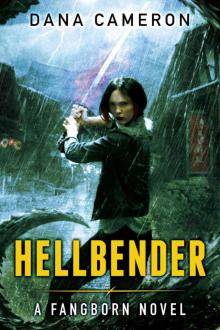 Hellbender (Fangborn Book 3)
Hellbender (Fangborn Book 3)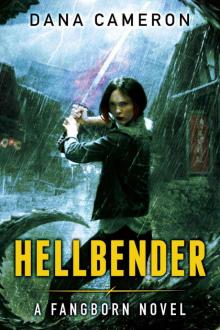 Hellbender (The Fangborn Series Book 3)
Hellbender (The Fangborn Series Book 3) Hellbender
Hellbender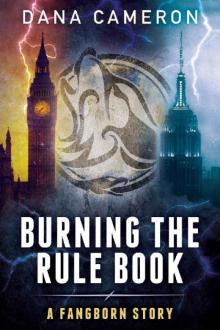 Burning the Rule Book
Burning the Rule Book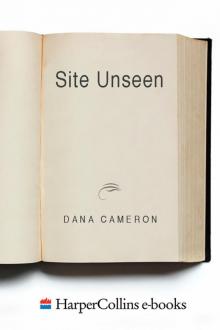 Site Unseen
Site Unseen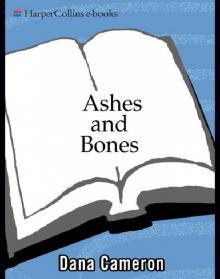 Ashes and Bones
Ashes and Bones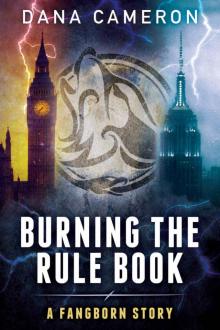 Burning the Rule Book (A Fangborn Story 3)
Burning the Rule Book (A Fangborn Story 3)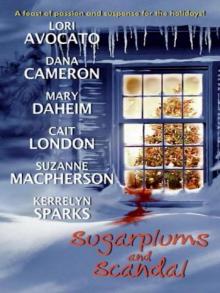 Sugarplums and Scandal
Sugarplums and Scandal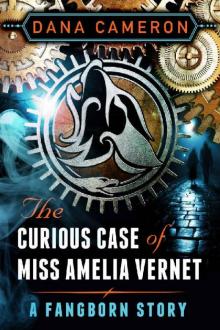 The Curious Case of Miss Amelia Vernet
The Curious Case of Miss Amelia Vernet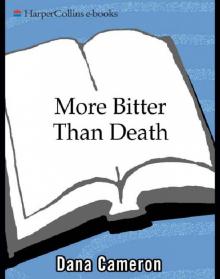 More Bitter Than Death
More Bitter Than Death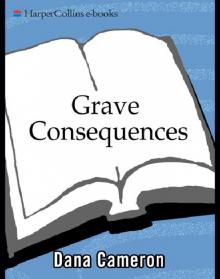 Grave Consequences
Grave Consequences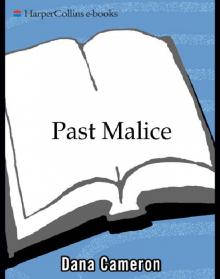 Past Malice
Past Malice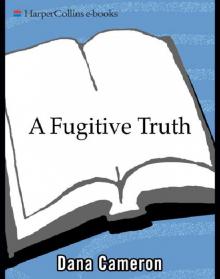 A Fugitive Truth
A Fugitive Truth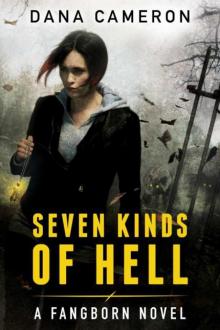 Seven Kinds of Hell
Seven Kinds of Hell